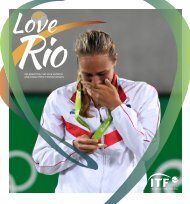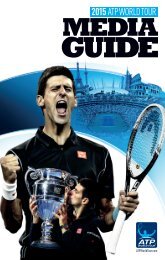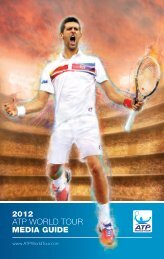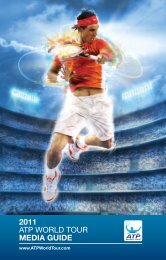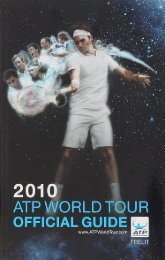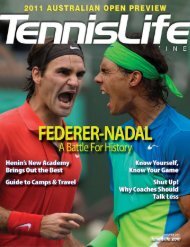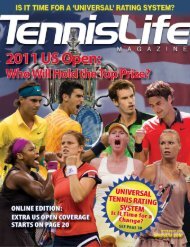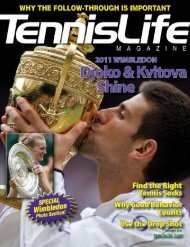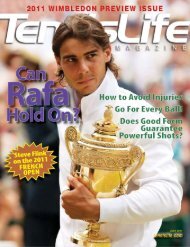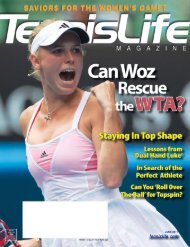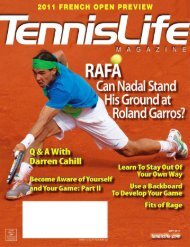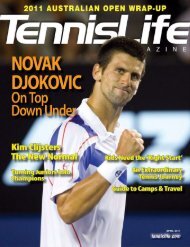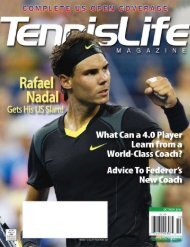A Champion's Mind - Pete Sampras
www.tennismoscow.me Insta:TENNISMOSCOW
www.tennismoscow.me Insta:TENNISMOSCOW
You also want an ePaper? Increase the reach of your titles
YUMPU automatically turns print PDFs into web optimized ePapers that Google loves.
With Davis Cup on the back burner for most of the spring and summer, and Andre much on my mind, I<br />
went to Europe with high hopes. Tim Gullikson knew how much it would mean, historically, for an<br />
attacker like me to win at Roland Garros, so we had worked extra hard on homework and preparation.<br />
I played four events leading up to Roland Garros, and lost my very first match at three of them (I made<br />
the semis at Hamburg). At the main event at Roland Garros, I lost 6–4 in the fifth, in the first round, to<br />
Austrian journeyman Gilbert Schaller. It was a difficult time; I felt things pressing in on me from all sides.<br />
Andre was a new threat; he had snatched away the number one ranking that had been mine for two years. I<br />
was still recuperating from my ulcer, and, with the United States still alive in Davis Cup, I felt<br />
overcommitted. And then there was the Tim situation. He’d been unable to travel to Europe, and I missed<br />
him.<br />
The good news was that my relationship with Paul Annacone was growing better all the time. Tim was<br />
still officially my coach, and it would stay that way until Tim made a miracle recovery—or the worstcase<br />
scenario came to pass. Paul and I knew that we had to prepare for the latter. I visited Tim a few<br />
times, and he put on a brave face, but he never looked better than the time before. We just wanted to make<br />
his life as productive and fulfilling for as long as possible while he fought his lonely battle.<br />
In June, shortly after Roland Garros, Andre and I filmed that series of “guerrilla tennis” commercials<br />
that would punctuate the upcoming summer on the hard courts of the U.S. Open. Soon thereafter, I atoned<br />
for my poor showing on clay by winning the two big grass events, Queen’s and Wimbledon. The<br />
Wimbledon title was my third straight, and while my four-set win over Boris Becker was unremarkable, I<br />
see it as a tipping point in my relationship with the grandest tournament of them all.<br />
The first year I won Wimbledon, I was boring, and Jim—the guy I beat—was boring. It was a<br />
personality thing. The second year I won Wimbledon, the tennis was boring—the way Goran and I played<br />
in the final was boring. It was a technical, game-based thing. But by 1995, the club had gone to a slower<br />
ball, and while I survived another brutal, five-set serving contest with Goran in the semis, briefly<br />
reigniting the furor over power tennis, the final against Becker was played in such a glow of camaraderie<br />
and good sportsmanship that it pleased even the most sour of pundits.<br />
The British loved Becker, and in this match he seemed to be passing the generational baton to me. The<br />
crowd must have felt that if Boris had such respect for me, I had to be okay. It also didn’t hurt that despite<br />
the controversies in which I had been embroiled at Wimbledon, I spoke of the tournament only in<br />
superlatives—and meant every word I said. I was slowly winning the Brits over. I was gratified by the<br />
way the degree of respect increased, because my own affection for Wimbledon had increased by the year,<br />
regardless of my image or how Wimbledon fans felt about me. It was a great feeling to love the place—<br />
and finally to feel loved in return.<br />
In my first few years at Wimbledon, I stayed at the St. James, which was one of the official player<br />
hotels right in the heart of London. But the smart guys, ever since the Bjorn Borg era, had found that the<br />
best thing was to rent a house in Wimbledon Village, an upscale suburb just up the hill from the All<br />
England Lawn Tennis and Croquet Club (that’s the official name of the place where they hold Wimbledon;<br />
the tournament unofficially got its name from the town, much the way the U.S. Open, back in the day, was<br />
often referred to as Forest Hills). The house I first rented and then stayed in for many years was on Clifton<br />
Road, and it was—I still laugh when I think about this—owned by people called “Borg.” Honest.<br />
The Borgs were no dummies. They did nearly as well as their tennis-playing namesake because of the<br />
tournament. I paid around £10,000, which in some years was close to $20,000, just to stay there for the<br />
two weeks of Wimbledon. Over time, I paid more and started to take the place for a month, from just after<br />
the French Open through Wimbledon. I believe Roger Federer took over the Borg house after I opted out<br />
of our contract one year, and how could you blame him, with that history?<br />
I’ve always been a little neurotic about air-conditioning; I like to sleep in a cool, dark room. So one of



